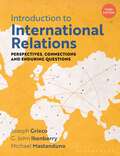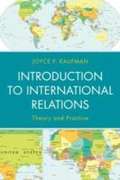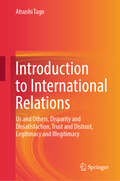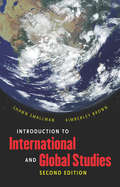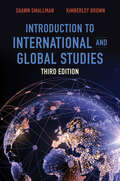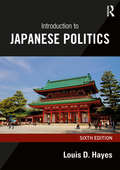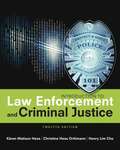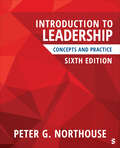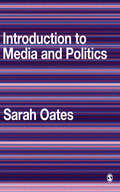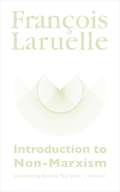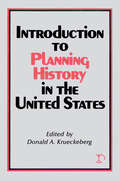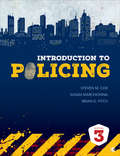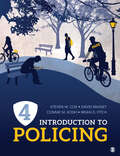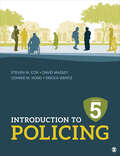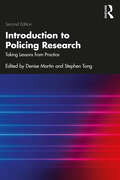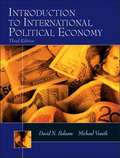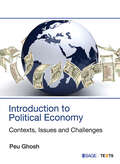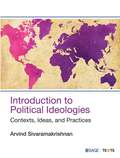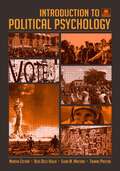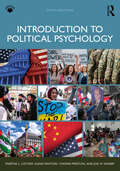- Table View
- List View
Introduction to International Relations: Perspectives, Connections and Enduring Questions
by Joseph Grieco G. John Ikenberry and Michael MastandunoThis bestselling introductory textbook provides a truly comprehensive and approachable guide to international affairs. Bringing together decades of combined experience in researching and teaching global politics from three acclaimed scholars, this book introduces you to the key concepts in international relations while equipping you with the tools to successfully analyse the rapidly changing world in which we live. Carefully and pedagogically structured, the book is driven by nuanced enduring questions to support active engagement with the subject matter. It covers everything from war and its causes to the pursuit of peace, the role of non-state actors on the world stage and transnational concerns such as climate change. Thought-provoking boxed features throughout highlight disparities between theory and practice, provide overviews of key research and make use of the influential levels-of-analysis framework. <P> This third edition is completely updated throughout, including extensive coverage of the latest advances in international relations scholarship and supported by a wealth of contemporary case examples. The text is supported by a rich companion website with study guides, instructor resources and interactive exercises to allow you to consider complicated political decisions for yourself. Introduction to International Relations is the ultimate companion for undergraduate students of politics and international relations in need of an exciting and rigorous introduction to the subject.
Introduction to International Relations: Theory and Practice
by Joyce P. KaufmanThis clear and concise text takes as its starting point the theoretical frameworks that are the foundation of current international relations. Kaufman explains the traditional theories, but also makes a place for understanding the areas that lie outside of or cannot be explained by those approaches. Although levels of analysis are the primary unifying force, the book also assesses what this approach does not explain about the contemporary international system.
Introduction to International Relations: Us and Others, Disparity and Dissatisfaction, Trust and Distrust, Legitimacy and Illegitimacy
by Atsushi TagoThis textbook provides a comprehensive introduction for individuals who are new to the discipline of International Relations or World Politics. It features three distinctive elements. First, it posits that understanding the international political economy is essential before delving into analyses of war and security, emphasizing that economic interdependence, arising from international cooperation, is a central theme in international relations. Second, the textbook recognizes that strategic interaction — where the decisions of one entity and future outcomes depend on the choices of another — is a core component of international relations. It also utilizes four key concepts in its exploration of the field: Us and Others, Disparity and Dissatisfaction, Trust and Distrust, and Legitimacy and Illegitimacy. Lastly, the textbook is attuned to the methodologies of the Social Sciences, including descriptive, causal, and deductive inferences, and it stands out for its commitment to fostering methodological awareness.
Introduction to International and Global Studies, Second Edition
by Kimberley Brown Shawn C. SmallmanThis innovative introduction to international and global studies, updated and revised in a new edition, offers instructors in the social sciences and humanities a core textbook for teaching undergraduates in this rapidly growing field. Encompassing the latest scholarship in what is a markedly interdisciplinary endeavor, Shawn Smallman and Kimberley Brown introduce key concepts, themes, and issues and then examine each in lively chapters on essential topics that include the history of globalization; economic, political, and cultural globalization; security, energy, and development; health; agriculture and food; and the environment. Within these topics, the authors explore such timely and pressing subjects as commodity chains, labor (including present-day slavery), human rights, multinational corporations, and the connections among them.New to this edition:* The latest research on debates over privacy rights and surveillance since Edward Snowden's disclosures* Updates on significant political and economic developments throughout the world, including a new case study of European Union, Icelandic, and Greek responses to the 2008 fiscal crisis* The newest information about the rise of fracking, the Fukushima nuclear disaster, the decline of the Peak Oil movement, and climate change, including the latter's effects on the Arctic and Antarctica* A dedicated website with authors' blog and a teaching tab with syllabi, class activities, and well-designed, classroom-tested resources* An updated teacher's manual available online, including sample examination questions, additional resources for each chapter, and special assistance for teaching ESL students * Updated career advice for international studies majors
Introduction to International and Global Studies, Third Edition
by Kimberley Brown Shawn C. SmallmanShawn C. Smallman and Kimberley Brown's popular introductory textbook for undergraduates in international and global studies is now released in a substantially revised and updated third edition. Encompassing the latest scholarship in what has become a markedly interdisciplinary endeavor and an increasingly chosen undergraduate major, the book introduces key concepts, themes, and issues and then examines each in lively chapters on essential topics, including the history of globalization; economic, political, and cultural globalization; security, energy, and development; health; agriculture and food; and the environment. Within these topics the authors explore such diverse and pressing subjects as commodity chains, labor (including present-day slavery), pandemics, human rights, and multinational corporations and the connections among them. This textbook, used successfully in both traditional and online courses, provides the newest and most crucial information needed for understanding our rapidly changing world.New to this edition:*Close to 50% new material*New illustrations, maps, and tables*New and expanded emphases on political and economic globalization and populism; health; climate change, and development*Extensively revised exercises and activities*New resume-writing exercise in careers chapter*Thoroughly revised online teacher's manual
Introduction to Japanese Politics
by Louis D. HayesIntroduction to Japanese Politics, now in its fully updated sixth edition, is a comprehensive and current review of political and public policy developments in Japan. Since the previous edition, Japan’s economic policy has undergone significant change with a prolonged period of deflation having altered the dynamics of the Japanese economy. At the same time, the Abe administration has expanded Japan’s international security participation, previously limited by the constitution, while China’s activities in the South China Sea have impinged upon Japan’s territorial claims. This classic introduction to the Japanese political system has been revised and fully updated in this sixth edition to take into account these widespread changes in the country's political life. Building on the structure and content of the previous edition, this new edition covers: An overview of Japan's geographical setting and history Japan’s political institutions, processes, and actors Recent organizational, ideological, and policy changes in the LDP since its return to power The country's distinctive social order and its educational, healthcare, and public safety systems The increasingly contentious realm of foreign relations and security issues, including China's expanding role and the effect of North Korea’s development of nuclear weapons. This broad-ranging textbook continues to be essential reading for students of Japanese politics, international politics and Japanese studies.
Introduction to Law Enforcement and Criminal Justice
by Christine Hess Orthmann Kären Matison Hess Henry Lim ChoThis comprehensive and practical book covers law enforcement and the criminal justice system as a whole (including courts, corrections, and juvenile justice) in one easy-to-understand volume. You'll find a realistic and relevant "boots on the street" perspective, real world examples in every chapter, and up-to-date information on a wide range of today's hottest topics. You'll learn about the ways technology is changing the day-to-day operations of policing and police interaction with the public; the recommendations of the President's Task Force on 21st Century Policing, including the need to improve trust and legitimacy with the public and a shift away from the warrior mentality to a guardian mindset; the law enforcement response to new terrorism threats such as ISIS and homegrown violent extremists; drones and other new surveillance techniques; and more.
Introduction to Leadership: Concepts and Practice
by Peter G. NorthouseNew chapter on Working with Groups! The Sixth Edition of Peter G. Northouse′s best-selling Introduction to Leadership: Concepts and Practice provides readers with a clear, concise overview of the complexities of practicing leadership and concrete strategies for becoming better leaders. The text is organized around key leader responsibilities such as creating a vision, engaging strengths, and managing conflict. Case studies, self-assessment questionnaires, observational exercises, and reflection and action worksheets allow readers to apply leadership concepts to their own lives. Grounded in leadership theory and the latest research, the fully updated, highly practical new edition includes a new chapter on working with groups, 2 new cases, and 6 new Leadership Snapshots.
Introduction to Leadership: Concepts and Practice
by Peter G. NorthouseNew chapter on Working with Groups! The Sixth Edition of Peter G. Northouse′s best-selling Introduction to Leadership: Concepts and Practice provides readers with a clear, concise overview of the complexities of practicing leadership and concrete strategies for becoming better leaders. The text is organized around key leader responsibilities such as creating a vision, engaging strengths, and managing conflict. Case studies, self-assessment questionnaires, observational exercises, and reflection and action worksheets allow readers to apply leadership concepts to their own lives. Grounded in leadership theory and the latest research, the fully updated, highly practical new edition includes a new chapter on working with groups, 2 new cases, and 6 new Leadership Snapshots.
Introduction to Logic and Critical Thinking
by Merrilee SalmonDesigned for students with no prior training in logic, INTRODUCTION TO LOGIC AND CRITICAL THINKING offers an accessible treatment of logic that enhances understanding of reasoning in everyday life. The text begins with an introduction to arguments. After some linguistic preliminaries, the text presents a detailed analysis of inductive reasoning and associated fallacies. This order of presentation helps to motivate the use of formal methods in the subsequent sections on deductive logic and fallacies. Lively and straightforward prose assists students in gaining facility with the sometimes challenging concepts of logic. By combining a sensitive treatment of ordinary language arguments with a simple but rigorous exposition of basic principles of logic, the text develops students' understanding of the relationships between logic and language, and strengthens their skills in critical thinking.
Introduction to Media and Politics
by Sarah Oates'...a lively introduction to media and politics, with timely chapters on the media, war and terrorism and the internet. If you want to know why media matters in politics this is a great place to start' - Dr Margaret Scammell, London School of Economics and Political Science 'This book has the truly international perspective that helps to put politics and media in the context of current world events...a unique and valuable text' - Professor Lynda Lee Kaid, University of Florida '...a new and promising perspective to the study of media and politics in a comparative dimension' - Professor Paolo Mancini, Università di Perugia Introduction to Media and Politics draws together evidence from the United States, the United Kingdom, Russia and beyond to provide students with an understanding of the relationship between the media and the political sphere. This highly accessible text: - balances theory with case studies on elections, war, terrorism, and the emerging role of the Internet, enabling the reader to think critically about how the media should work in the service of democracy. - places the study of media and politics in a comparative perspective, allowing the reader to consider how the same media institutions - including commercial and public service broadcasting, paid political advertising, and war coverage - function in different countries. This text is essential reading for advanced undergraduate and postgraduate students of media and politics.
Introduction to Non-Marxism (Univocal)
by François LaruelleFollowing the collapse of the communist states it was assumed that Marxist philosophy had collapsed with it. In Introduction to Non-Marxism, François Laruelle aims to recover Marxism along with its failure by asking the question &“What is to be done with Marxism itself?&” To answer, Laruelle resists the temptation to make Marxism more palatable after the death of metaphysics by transforming Marxism into a mere social science or by simply embracing with evangelical fervor the idea of communism. Instead Laruelle proposes a heretical science of Marxism that will investigate Marxism in both its failure and power so as to fashion new theoretical tools. In the course of engaging with the material of Marxism, Laruelle takes on the philosophy of Marx along with important philosophers who have extended that philosophy including Althusser, Balibar, Negri as well as the attempt at a phenomenological Marxism found in the work of Michel Henry. Through this engagement Laruelle develops with great precision the history and function of his concept of determination-in-the-last-instance. In the midst of the assumed failure of Marxism and the defections and resentment that followed, Laruelle&’s non-Marxism responds with the bold declaration: &“Do not give up on theory!&”
Introduction to Planning History in the United States
by Donald A. KrueckebergThis book is an introduction to the history of the city planning profession in the United States, from its roots in the middle of the nineteenth century to the present day. The work examines important questions of American planning history. Why did city planning develop in the manner it did? What did it set out to achieve and how have those goals changed? Where did planning thrive and who were its leaders? What have been the most important ideas in planning and what is their relation to thought and social development?By answering these questions, this book provides a general understanding for further study of the extensive literature of planning and urban history.Donald A. Krueckeberg divides this work into three historical periods: an initial period of independent but gradually converging concepts of a planned city; a second period of national organization, experimentation, and development; and a third period of implementation of planning ideas in nearly all levels and areas of urban policymaking.Krueckeberg begins with revealing the origins of modern planning in the movements for sanitary reform, civic art and beautification, classical revival in civic design, and neighborhood settlements and housing reform. A second section covers the institutionalization of the profession; the rise of zoning and comprehensive planning; influential figures of the period; and the new communities program of the New Deal. The book contains case studies and focuses on the role of the planner and the effectiveness of the profession. Krueckeberg concludes with a bibliography of planning history in the United States.
Introduction to Policing
by Susan Marchionna Steven M. Cox Brian D. FitchIntroduction to Policing, Third Edition continues to focus on the thought-provoking, contemporary issues that underscore the challenging and rewarding world of policing. Steven M. Cox, Susan Marchionna, and experienced law enforcement officer Brian D. Fitch balance theory, research, and practice to give students a comprehensive, yet concise, overview of both the foundations of policing and the expanded role of today’s police officers. The accessible and engaging writing style, combined with stories from the field, make policing concepts and practices easy for students to understand and analyze. Unique coverage of policing in multicultural communities, the impact of technology on policing, and extensive coverage of policing strategies and procedures — such as those that detail the use of force —make this bestselling book a must-have for policing courses.
Introduction to Policing
by Susan Marchionna Steven M. Cox Brian D. FitchIntroduction to Policing, Third Edition continues to focus on the thought-provoking, contemporary issues that underscore the challenging and rewarding world of policing. Steven M. Cox, Susan Marchionna, and experienced law enforcement officer Brian D. Fitch balance theory, research, and practice to give students a comprehensive, yet concise, overview of both the foundations of policing and the expanded role of today’s police officers. The accessible and engaging writing style, combined with stories from the field, make policing concepts and practices easy for students to understand and analyze. Unique coverage of policing in multicultural communities, the impact of technology on policing, and extensive coverage of policing strategies and procedures — such as those that detail the use of force —make this bestselling book a must-have for policing courses.
Introduction to Policing
by Steven M. Cox Brian D. Fitch David W. Massey Connie M. KoskiWritten and extensively updated by an author team that includes former and current law enforcement officers, Introduction to Policing focuses on the thought-provoking, contemporary issues that underscore the challenging and rewarding world of policing. The authors skillfully balance research and practice to offer readers an overview of both the foundations of policing and the expanded role of today’s police officers. Evolving with the modern realities of the field, the Fourth Edition discusses major new and ongoing impactful events, such as the political shift marked by the U.S. presidential election of 2016 and expanded coverage of women and minorities in policing. The accessible and engaging writing style, coupled with unique coverage of the issues of policing in multicultural communities, the impact of technology on policing, and policing strategies and procedures, make this bestselling book a must-have.
Introduction to Policing
by Steven M. Cox Brian D. Fitch David W. Massey Connie M. KoskiWritten and extensively updated by an author team that includes former and current law enforcement officers, Introduction to Policing focuses on the thought-provoking, contemporary issues that underscore the challenging and rewarding world of policing. The authors skillfully balance research and practice to offer readers an overview of both the foundations of policing and the expanded role of today’s police officers. Evolving with the modern realities of the field, the Fourth Edition discusses major new and ongoing impactful events, such as the political shift marked by the U.S. presidential election of 2016 and expanded coverage of women and minorities in policing. The accessible and engaging writing style, coupled with unique coverage of the issues of policing in multicultural communities, the impact of technology on policing, and policing strategies and procedures, make this bestselling book a must-have.
Introduction to Policing
by Steven M. Cox David W. Massey Connie M. Koski Ericka WentzWritten by an author team that includes former and current law enforcement officers, Introduction to Policing focuses on the most thought-provoking, contemporary issues in the world of policing. The authors tackle complex issues that impact policing today, such as social diversity; advancements in technology; and global issues, such as terrorism and transnational organized crime. The Fifth Edition offers fully updated content in SAGE’s Vantage courseware platform. This title is accompanied by a complete teaching and learning package. Contact your SAGE representative to request a demo. Learning Platform / Courseware SAGE Vantage is an intuitive learning platform that integrates quality SAGE textbook content with assignable multimedia activities and auto-graded assessments to drive student engagement and ensure accountability. Unparalleled in its ease of use and built for dynamic teaching and learning, Vantage offers customizable LMS integration and best-in-class support. It’s a learning platform you and your students will actually love. Learn more. Assignable Video with Assessment Assignable video (available in SAGE Vantage) is tied to learning objectives and curated exclusively for this text to bring concepts to life. Watch a sample video now. LMS Cartridge: Import this title’s instructor resources into your school’s learning management system (LMS) and save time. Don’t use an LMS? You can still access all of the same online resources for this title via the password-protected Instructor Resource Site. Learn more.
Introduction to Policing
by Steven M. Cox David W. Massey Connie M. Koski Ericka WentzWritten by an author team that includes former and current law enforcement officers, Introduction to Policing focuses on the most thought-provoking, contemporary issues in the world of policing. The authors tackle complex issues that impact policing today, such as social diversity; advancements in technology; and global issues, such as terrorism and transnational organized crime. The Fifth Edition offers fully updated content in SAGE’s Vantage courseware platform. This title is accompanied by a complete teaching and learning package. Contact your SAGE representative to request a demo. Learning Platform / Courseware SAGE Vantage is an intuitive learning platform that integrates quality SAGE textbook content with assignable multimedia activities and auto-graded assessments to drive student engagement and ensure accountability. Unparalleled in its ease of use and built for dynamic teaching and learning, Vantage offers customizable LMS integration and best-in-class support. It’s a learning platform you and your students will actually love. Learn more. Assignable Video with Assessment Assignable video (available in SAGE Vantage) is tied to learning objectives and curated exclusively for this text to bring concepts to life. Watch a sample video now. LMS Cartridge: Import this title’s instructor resources into your school’s learning management system (LMS) and save time. Don’t use an LMS? You can still access all of the same online resources for this title via the password-protected Instructor Resource Site. Learn more.
Introduction to Policing Research: Taking Lessons from Practice
by Stephen Tong Denise MartinThis book offers a first-hand insight into the work of policing scholars and the research that they undertake. Bringing together a range of leading scholars and drawing on a range of pressing topics, it introduces the diverse nature of policing research, and the ethical and practical challenges faced by policing researchers. Each chapter brings clarity to the concept of empirical research within policing, introduces readers to the theoretical explanations and assumptions that underpin the rational of research design in policing, as well as considering the limitations of research. Topics include: • research methods in police research; • police professionalisation; • police and diversity; • police leadership; • undercover policing; • police and vulnerability; • activist research; • social media and policing. This revised and expanded new edition includes more focus on the role of research in policing, police and academic partnerships and practitioners as researchers, as well as a brand new section offering international perspectives on policing research. Brimming with practical examples, case studies, key learning points and practical advice, this book is essential reading for Professional Policing students, as well as early-career researchers and those engaged with criminological research methods.
Introduction to Political Economy
by David N. Balaam Michael VesethHistory and overview of political economy
Introduction to Political Economy: Contexts, Issues and Challenges
by Peu GhoshA comprehensive and engaging textbook that guides students on the major issues and debates of contemporary international political economy. This textbook takes a fresh look at the fundamental concepts and principles of political economy and how economics and politics are closely linked on the world stage. It offers simple explanations of complex topics and guides the reader through important debates in contemporary political economy using a data-driven approach presented in easy-to-understand figures and tables. The book uses real-world examples and statistics to illustrate the theoretical ideas of the discipline and encourages students to understand the world economic order and its relation to regional as well as global politics. Introduction to Political Economy will prove to be a valuable companion for UG students of political science as well as UGC NET and civil services aspirants who look forward to having a comprehensive yet compact introduction to the subject. Key Features: • Up-to-date data to analyse the issues of contemporary political economy • Written in a simple, lucid style to facilitate easy understanding • Summaries at the end of each chapter to help readers access essential information • Extensive review exercises to ensure maximum retention
Introduction to Political Ideologies: Contexts, Ideas, and Practices
by Arvind SivaramakrishnanThis new textbook shows that each of the major political ideologies gives rise to, or in some cases specifies, a particular view of human beings, with significant consequences for the ways we organise our political systems and our forms of political participation. In each chapter, the author provides a brief historical introduction and then outlines the key points of the ideology concerned. He then demonstrates conceptual and practical issues that arise thence, including successes and failures in the implementation of the selected ideologies. The chapters follow a broad conceptual sequence and adopt a chronological order where appropriate. This clear, direct, and accessible textbook aims to aid the reader to identify and evaluate the assumptions underlying a wide range of public matters. The intention is to help enhance readers' understanding of major public issues, so that they can ask more incisive and better-informed questions about those. Key Features • Each chapter supplemented by an apposite list of suggested readings and extension exercises • A dedicated chapter on Technocracy and Managerialism • A dedicated chapter on Poststructuralism and Postmodernism • An ideal companion for students from different backgrounds, including political science, public administration, philosophy, public policy, law, journalism, and other areas
Introduction to Political Psychology
by Thomas Preston Beth Dietz Martha L. Cottam Elena MastorsThe first comprehensive textbook on political psychology, this user-friendly volume explores the psychological origins of political behavior. Using psychological concepts to explain types of political behavior, the authors introduce a broad range of theories and cases of political activity to illustrate the behavior. The book examines many patterns of political behaviors including leadership, group behavior, voting, race, ethnicity, nationalism, political extremism, terrorism, war, and genocide. Text boxes highlight current and historical events to help students see the connection between the world around them and the concepts they are learning. Examples highlight a variety of research methodologies used in the discipline such as experimentation and content analysis. The "Political Being" is used throughout to remind the reader of the psychological theories and concepts to be explored in each chapter. Introduction to Political Psychology explores some of the most horrific things people do to one another for political purposes, as well as how to prevent and resolve conflict, and how to recover from it. The goal is to help the reader understand the enormous complexity of human behavior and the significant role political psychology can play in improving the human condition.Designed for upper division courses on political psychology or political behavior, this volume also contains material of interest to those in the policymaking community.
Introduction to Political Psychology
by Thomas Preston Martha L. Cottam Elena Mastors Joe W. HusebyThis fifth edition of Introduction to Political Psychology explores the many psychological patterns that influence individual political behavior. The authors introduce readers to a broad range of theories, concepts, and case studies of political activity, arguing that individuals are driven or motivated to act in accordance with personality characteristics, values, beliefs, and attachments to groups. The book explains many aspects of political behavior—whether seemingly pathological actions or normal decision-making practices, which sometimes work optimally, and sometimes fail.Thoroughly updated throughout, the book examines patterns of political behavior in areas including leadership, group behavior, voting, race, nationalism, terrorism, and war. This edition features: Detailed coverage of political polarization, and the psychology behind it; Up-to-date topics and case studies focused on the 2024 US election, the war in Ukraine, and the Israel–Palestine conflict, as well as social movements such as climate change activism, Black Lives Matter, and #MeToo; A robust suite of timesaving support material. Accessibly written and comprehensive in scope, it is an essential companion for all graduate and upper-level undergraduate students of psychology, political science, and political psychology. It will also be of interest to those in the policy-making community, especially those looking to learn more about the extent to which perceptions, personality, and group dynamics affect the policy-making arena.
